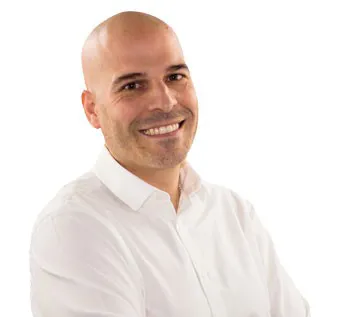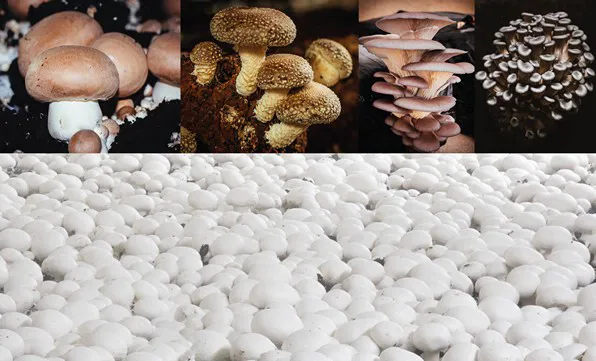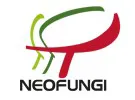Since the pioneering cultivation of mushrooms started at the end of the 1950's in the region of La Manchuela, this agricultural sector has been growing and becoming more technical in Castile-La Mancha, turning this autonomous region into Spain's largest mushroom producer. In fact, according to data from the Ministry of Agriculture, Fisheries and Food, Castile-La Mancha produces more than 50% of the country's mushrooms and almost 61% of the other varieties of cultivated mushrooms. And that is where Neofungi, the largest producer of mushrooms for fresh consumption in the Iberian Peninsula, is located.
"Neofungi is a second-tier cooperative made up of the first-tier cooperatives Champinter and Mercajucar. We grow regular mushrooms, Portobello, Oyster mushrooms, Shiitake and Eriingy, and our annual production exceeds 30 million kilos," says Sergio Pinto, of the entity with headquarters in the municipalities of Villamalea and Villalgordo del Júcar, Albacete.

"We work with a circular economy model. We produce the seed in the mycelium laboratory, which we will later be sown in our compost plant. In fact, we have the most modern plant in the Iberian Peninsula and one of the most advanced in Europe. This compost is transferred to the climate-controlled cultivation facilities, where we control the humidity, temperature and CO₂ at each step of the process. Once the crop cycle is finished and the compost is exhausted, we process it in the recycling plant to obtain fertilizers that will later be used in agriculture; in other words, we give back to the field in the form of fertilizer what the field gave us in the form of cereal straw -the main raw material for the manufacture of compost-. We also have a cannery where we showcase the various canned mushrooms to our customers."
Portobello consumption on the rise
Regular white mushrooms continue to be the most consumed cultivated mushroom in Spain, followed by Oyster mushrooms, although the Portobello has recorded an interesting growth in the demand in recent years, says Sergio. "About 10 years ago, the share of the Portobello in the total domestic consumption with respect to white mushrooms did not reach 1%, while today that percentage already stands at 15%."
"In the United States, the share of Portobello consumption has already reached 50% and in Europe it stands at around 30%, so we believe that this product still great potential for growth in the domestic market."
"As for other mushroom varieties, the crisis has not helped certain varieties, such as the Eriingy and Shiitake, to grow in terms of consumption, although it is necessary to point out that these are very important mushrooms, not only for their culinary characteristics or their tastiness, but also for their health benefits," says Sergio. "The Shiitake is a true 'medicine' and, as such, it is basic in oriental food. Moreover, it is the most consumed mushroom in the world, except in Mediterranean countries."

Production costs
The technification and climate control in edible mushroom cultivation has made it possible to control the main factors for their production, and with that, the possibility of supplying consumers throughout the year with a whole range of healthy and versatile products of the highest quality. We had the chance to see this at the Neofungi showcooking at the latest edition of Fruit Attraction, where a well-known Spanish chef prepared mushrooms stuffed with cherry liqueur and dipped in chocolate- and which are a good source of vegetable protein. All this, moreover, is reflected in an on-going growing trend in their consumption.
However, in recent months the cultivation of mushrooms has been greatly affected by the escalation of energy costs, because "as mushrooms are one of the worst hit when it comes to increases in the cost of electricity and diesel," says Sergio Pinto. "Air conditioning requires a constant supply of energy, and the compost production plant does, too, so in these months the production costs have increased a lot. For now, it has been possible to pass on part of that increase to the final price, but the other part is being covered by the growers."
"This is already making it difficult for expansions to be carried out and new projects to be launched. Really, we don't know what is going to happen in the coming months if we are not able to pass on the total increase in the price of our product. We must remember that, in this area of La Mancha, mushroom cultivation contributes to the generation of employment and the fixation of the rural population - our sector, in fact, has lowered unemployment rates and even brought it to zero in many villages."
Michelin-starred Portobellos
Neofungi collaborates with the world-renowned chef Martín Berasategui, holder of 12 Michelin stars, among other multiple international recognitions, and recently awarded the Chef Mentor prize by the Michelin Guide Spain & Portugal 2022, to whom it supplies the Portobello used in his restaurants.
"Consumers can also purchase our Portobellos in Spain's main retail chains, as well as in the main central markets in the country. In addition, at the end of April, at the Gourmet fair, we will present Neofungi's new project: the new microwaveable and bakeable stuffed mushrooms," says Sergio.
 For more information:
For more information:
Neofungi
Camino Quintanar s/n
02636 Villalgordo del Júcar, Albacete, Spain
Tel.: +34 967 45 50 94
neofungi@neofungi.es
https://neofungi.com
